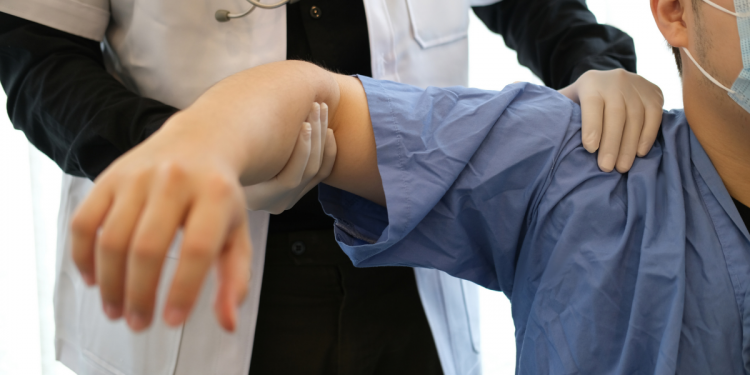Normally athletes have the shoulder impingement syndrome with shoulder aches, specifically those who take part in overhead and/or throwing activities. Different kinds of shoulder impingement include subacromial, subcoracoid, and inner impingement. The diagnosis and treatment of shoulder impingement syndrome in athletes may be challenging, for the reason that this situation is multifactorial. Athletes with a suspected diagnosis of shoulder impingement syndrome have to be encouraged to demonstrate the particular movement that triggers their symptoms. In maximum cases of shoulder impingement, nonsurgical treatment options can be encouraged first. However, a program of rest, pain medication, and physical therapy can remove aches in a matter of weeks.
Overview of Shoulder Impingement
Shoulder impingement syndrome (additionally referred to as subacromial impingement, painful arc syndrome, or Rotator Cuff Tendinitis) is one of the most common reasons for shoulder ache. This results from the repetitive compression or “impingement” of the rotator cuff between the top arm bone (humerus) and the shoulder blade (scapula). This commonly happens after someone endures an acute shoulder injury. A person will harm his shoulder because of sudden falls or performing an extensive variety of tasks. Pain might also get worse when left untreated or even consequences in a rotator cuff tear. The good news is, you do not need to undergo the pain and there are sensible treatment options that could take away or reduce your ache to a super extent. Physical therapists will correctly diagnose your damage and prescribe the right treatment plan.
Treatment options for shoulder impingement
Many treatment options are there for shoulder impingement, relying on how extreme the case is. The Orthopaedist commonly tries and begins the treatment with the use of Non-Surgical methods earlier than opting for surgery.
-
Non-Steroidal Anti-Inflammatory Medicines
The orthopaedist may offer easy analgesics and Non-Steroidal Anti-Inflammatory Medicines (NSAIDs) for lowering aches.
-
Physical Therapy
Formal physical therapy might require, if signs undergo despite the initial treatment, to help in lessening irritation and ache via ultrasound, electric stimulation, or different modalities. Eventually, all sufferers have to start a shoulder-strengthening program, especially athletes with a unique interest in the rotator cuff muscles. Physical therapy could consist of postural strengthening, isotonic physical activities of periscapular and rotator cuff strengthening, and isometrics.
-
Steroid injection
If an extra conservative treatment cannot control your shoulder impingement, then your orthopaedist may also suggest a steroid injection. This is injected into the tendon to lessen infection and pain. He may also offer a cortisone injection into the subacromial bursa to reduce infection.
-
Stem Cell Treatment
Stem cell therapy gives the treatment for the shoulder impingement and wear and tear of the joint cartilage. This includes harvesting adult stem cells from a patient’s adipose (fatty) tissue and bone marrow. Then it is consolidated and organize for injection into the broken regions of the shoulder. Total tears usually require surgical repair. However partial tears to the rotator cuff are regularly excellent candidates for stem cell treatment to the shoulder.
-
Rest
A person needs to keep away from overhead sports and speedy movement, including sports activities that require throwing or swinging. It is satisfactory to keep away from common shoulder movement. However, total immobilization can avoid. Immobilization can result in weakness, stiffness, and worsening shoulder problems.
-
Electrical stimulation
Electrical stimulation can help lessen ache and swelling. Your healthcare provider attaches small pads for your shoulder. A moderate electric power current then flows into your shoulder. You might also additionally experience tingling.
-
Ultrasound
Ultrasound can help lessen aches. First, a slick gel or medicated cream is carried out for your shoulder. Then your healthcare provider locates a small tool over the area. The tool makes use of sound waves to loosen shoulder tightness. This treatment needs to be ache free.
When to visit a doctor
Shoulder impingement syndrome is normally diagnosed in athletes with shoulder pain. Rest is fundamental to healing your shoulder. If an activity hurts, do not do it. Otherwise, you could not save your healing and growth pain. Your shoulder wishes for active rest. This approach avoids overhead actions and sports that motivate pain. But do not prevent the use of your shoulder completely. This can cause it to stiffen or “freeze.” In addition to rest, impingement may be dealt with through these methods. Your healthcare provider lets you find which of these is fine for you. A physical therapist also can assist you with sports unique to your condition.










Discussion about this post